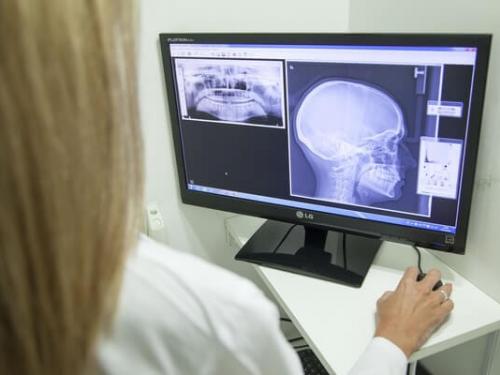
There are two main routes into Radiography. Diagnostic Radiographers create radiographs, with the help of x-rays, to help diagnose disease or trauma. To become a Diagnostic Radiographer you will need a BSc. (Hons) degree in Diagnostic Radiography (sometimes called Diagnostic Imaging).
Therapeutic Radiography prepares students to be on the front line of fighting cancer. If you choose this specialism you would need to study for a BSc. (Hons) degree in Radiotherapy (sometimes called Radiography and Oncology). With both pathways, you will need to register with the Health and Care Professions Council (HCPC).
What are the university entry requirements for Radiography degrees?
To apply to universities for Radiography degrees, you should have or be working towards achieving a relevant Access to HE Diploma in Health Science. Or, alternatively, 3 A Levels with at least one in a science (Human Biology, Biology, Physics, Chemistry, Psychology, Sociology, Geography or Maths). Universities can advise on their particular entry requirements and they also publish these on the UCAS (Universities and Colleges Admissions Service) website. With the A Level route, you may also be expected to have a minimum of 5 GCSEs.
With the Access to HE Diploma route, you are normally only required to have 2 GCSEs in English and Maths at Grade C or above. Access to HE Diplomas are normally aimed towards adults 18+ returning to education or wishing to change to a new career. There are no upper age limits. The Diploma qualification is viewed as being equivalent to 3 A Levels. Access to HE can be studied from home via online learning or at a local college.
Although students will need a good level of English for this course, there is a particular need within Radiography for students who are fluent in languages other than English. Some Universities will look on such students favourably. Radiography has high employability rates for graduates, with some universities reporting 95% of students being employed within 6 months of graduating.
Enrol on an Access to HE course now
What do Radiographers do?
There are two main areas of Radiography and several smaller specialisations. The Diagnostic Radiographer uses various forms of imaging technology, such as X-Rays (used to create Radiographs), to look inside the body and find the cause of an illness, or look at the extent of any trauma. They work in various hospital departments and in time may also be involved in establishing treatment plans.
The Therapeutic Radiographer specialises in devising and carrying out radiotherapy treatment plans for patients, most of whom have cancer. You'll administer doses of radiation to targeted diseased tissue and minimise the amount of radiation to surrounding healthy tissue. Whilst most of the caseload would be working within cancer treatment, you would also treat some blood disorders and benign diseases.
What personal attributes are needed to become a Radiographer?
-
-
- Caring, able to empathise with service users and their families
- Confidence in using cutting-edge technology
- Adaptability, the field of Radiography is constantly evolving
- Calmness under pressure
-
What are the pay and working conditions like?
-
-
- As a newly qualified radiographer, your starting salary will be around £27,055 (Band 5), rising up the pay scale to £32,934
- As an experienced radiographer, you can earn between £26,300 and £35,230
- Salaries for specialist radiographers are between £33,706 and £40,588 (Band 6) while at consultant level you can earn up to £68,484
- Salaries for advanced radiographer practitioners and management roles are between £41,659 and £48,526 (Bands 7 to 8a)
- Additionally, for 2023–2024, there will be a permanent 5% wage increase across all pay tiers. The wage offer, according to ministers, won't have an effect on frontline services in any way
-
Cost of living payments are added for workers in some parts of the country. On-call allowances and overtime payments are paid in addition to the basic salary.
Did you know?
-
-
- 40% of all patients cured by cancer are cured by radiotherapy
- Radiographers are on the NHS ‘Shortage Occupation List', there are many vacancies
- In the last 15 years, invasive surgery has decreased by 95% with the help of more advanced imaging technology used by radiographers
- You can be part of this rapidly evolving, life-saving profession!
-
How is the degree funded?
Studying to become a Radiographer allows you to apply for the standard student support package in the form of a student loan. Scholarships, bursaries or grants may also be available for example, through the university or your place of work.
If you would like to complete an online Access to Radiography course with Academy Online Learning to obtain the level 3 Access Diploma in Health Science Professions for university entry, please choose your payment options below or contact us for more information.
Price Options
The cost of the Access to Higher Education Diploma (Health Science Professions) and the Access to Higher Education Diploma (Business) are £1320, and can be paid in monthly instalments from £110 per month over 12 months with 0% interest. Or discounted price at £1270 (£50 saving) when paid in full upfront.
Monthly Payment |
Cost/ Month |
Total* |
|---|---|---|
Pay in full |
Pay in full
|
£
|
- |
- |
- |
12 Months |
£110 |
£1320 |
11 Months |
£120 |
£1320 |
10 Months |
£132 |
£1320 |
9 Months |
£146 |
£1320 |
8 Months |
£165 |
£1320 |
7 Months |
£188 |
£1320 |
6 Months |
£220 |
£1320 |
* Includes £150 registration fee and certification with our awarding organisation, Skills and Education Group Access
For an instalment plan that works for you, visit our:
>>> STORE PAGE >>>
0161 726 5970
for more information


